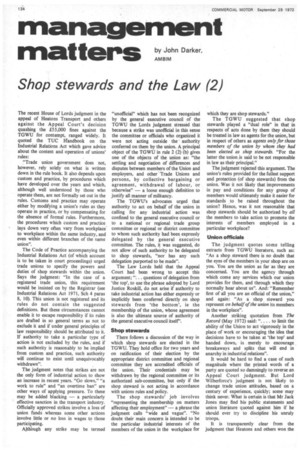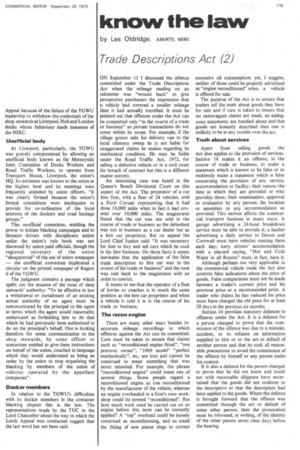management matters
Page 416

Page 417

If you've noticed an error in this article please click here to report it so we can fix it.
by John Darker,
AMBIM
Shop stewards and the Law (2)
The recent House of Lords judgment in the appeal of Heatons Transport and others against the Appeal Court's decision quashing the £55,000 fines against the TGWU for contempt, ranged widely. It quoted the TUC Handbook on the Industrial Relations Act which gave advice about the content and operation of unions' rules: "Trade union government does not, however, rely solely on what is written down in the rule book. It also depends upon custom and practice, by procedures which have developed over the years and which, although well understood by those who operate them, are not formally set out in the rules. Customs and practice may operate either by modifying a union's rules as they operate in practice, or by compensating for the absence of formal rules. Furthermore, the procedures which custom and practice lays down very often vary from workplace to workplace within the same industry, and even within different branches of the same union".
The Code of Practice accompanying the Industrial Relations Act (of which account is to be taken in court proceedings) urged trade unions to specify the powers and duties of shop stewards within the union. Says the judgment: "In the case of a registered trade union, this requirement would be insisted on by the Registrar (see Industrial Relations Act 1971, Sch 4 paras 8, 10). This union is not registered and its rules do not contain the suggested definitions. But these circumstances cannot enable it to escape responsibility if its rules are drafted in so general terms as not to exclude it and if under general principles of law responsibility should be attributed to it. If authority to take a particular type of action is not excluded by the rules, and if such authority is reasonably to be implied from custom and practice, such authority will continue to exist until unequivocably withdrawn".
The judgment notes that strikes are not the only form of industrial action to show an increase in recent years. "Go slows," "a work to rule" and "an overtime ban" are other ways of applying pressure. To these may be added blacking — a particularly effective sanction in the transport industry. Officially approved strikes involve a loss of union funds whereas some other actions involve little or no loss in wages to those participating.
Ajthbugh any strike may be termed "unofficial" which has not been recognized by the general executive council of the TGWU the Lords judgment stressed that because a strike was unofficial in this sense the committee or officials who organized it were not acting outside the ' authority conferred on them by the union. A principal object of the TGWU in rule 2 (2) (b) gives one of the objects of the union as: "the settling and negotiation of differences and disputes between members of the Union and employers, and other Trade Unions and persons, by collective bargaining or agreement, withdrawal of labour, or otherwise" — a loose enough definition to justify all manner of militancy.
The TGWU's advocates urged that authority to act on behalf of the union in calling for any industrial action was confined to the general executive council or to a national or regional trade group committee or regional or district committee to whom such authority had been expressly delegated by the general executive committee. The rules, it was suggested, do not allow of such authority to be delegated to shop stewards, "nor has any such delegation purported to be made".
The Law Lords held that the Appeal Court had been wrong to accept this argument; "... questions of delegation from 'the top', to use the phrase adopted by Lord Justice Roskill, do not arise if authority to take industrial action has either expressly or implicitly been conferred directly on shop stewards from 'the bottom', ie the membership of the union, whose agreement is also the ultimate source of authority of the general executive council itself".
Shop stewards There follows a discussion of the way in which shop stewards are elected in the TGWU. They hold office for two years and on ratification of their election by the appropriate district committee and regional committee they are accredited officials of the union. Their credentials may be withdrawn by the regional committee or its authorized sub-committee, but only if the shop steward is not acting in accordance with unions rules and policy.
The shop stewards' job involves "representing the membership on matters affecting their employment" — a phrase the judgment calls "wide and vague". "No doubt their main concern is intended to be the particular industrial interests of the members of the union in the workplace for which they are shop stewards."
The TGWU suggested that shop stewards played a "dual role" in that in respects of acts done by them they should be treated in law as agents for the union, but in respect of others as agents only for those members of the union by whom they had been elected as shop stewards. "For the latter the union is said to be not responsible in law as their principal."
The judgment rejected this argument. The union's rules provided for the fullest support and protection (of shop stewards) from the union. Was it not likely that improvements in pay and conditions for any group of members would ultimately make it easier for standards to be raised throughout the union? Hence, was it not reasonable that shop stewards should be authorized by all the members to take action to promote the interests of members employed in a particular workplace?
Union officials The judgment quotes some telling extracts from TGWU literature, such as: "As a shop steward there is no doubt that the eyes of the members in your shop are on you. You are the union as far as they are concerned. You are the agency through which come any services which our union provides for them, and through which they normally hear about us". And: "Remember first of all you are an official of the union," and again: "As a shop steward you represent on behalf of the union its members in the workplace".
Another striking quotation from The Record (May 1972) said: ". ... to limit the ability of the Union to act vigorously in the place of work or encouraging the idea that decisions have to be taken at 'the top' and handed down, is merely to encourage breakaways and splits that will end in anarchy in industrial relations".
It would be hard to find a case of such magnitude where the printed words of a party are quoted so damningly to reverse an Appeal Court judgment. But Lord Wilberforce's judgment is not likely to change trade union attitudes, based on a century of experience, quickly; some may think never. What is certain is that Mr Jack Jones may find his public statements and union literature quoted against him if he should ever try to discipline his unruly troops.
It is transparently clear from the judgment that Heatons and others won the Appeal because of the failure of the TGWU leadership to withdraw the credentials of the shop stewards at Liverpool, Hull and London docks whose behaviour made nonsense of the NIRC.
Unofficial body At Liverpool, particularly, the TGWU was gravely compromised by allowing an unofficial body known as the Merseyside Joint Committee of Docks Workers and Road Traffic Workers, to operate from Transport House, Liverpool, the union's HQ. Its existence was known to the union at the highest level and its meetings were frequently attended by union officers. "It was clearly formed because the union's formal committees were inadequate to provide for co-ordination of the local interests of the dockers and road haulage groups."
This unofficial committee, wielding the power to initiate blacking campaigns and to threaten drivers with disciplinary action under the union's rule book was not disowned by union paid officials, though the regional secretary of the' union "disapproved" of the use of union notepaper — the unofficial committee duplicated a circular on the printed notepaper of Region 6 of the TGWU.
The judgment contains a passage which spells out the essence of the issue of shop stewards' authority: "To be effective in law a withdrawal or curtailment of an existing actual authority of an agent must be communicated by the principal to the agent in terms which the agent would reasonably understand as forbidding him to do that which he had previously been authorized to do on the principal's behalf. One is looking therefore for some communication to the shop stewards, by some officer or committee entitled to give them instructions on behalf of the union, couched in language which they would understand as being an order by the union to stop organizing the blacking by members of the union of vehicles operated by the appellant companies".
Docker members
In relation to the TGWU's difficulties with its docker members in the container blacking dispute this is the law. The representations made by the TUC to the Lord Chancellor about the way in which the Lords Appeal was conducted suggest that the last word has not been said.
































































































































































































































































































































































































































































































































